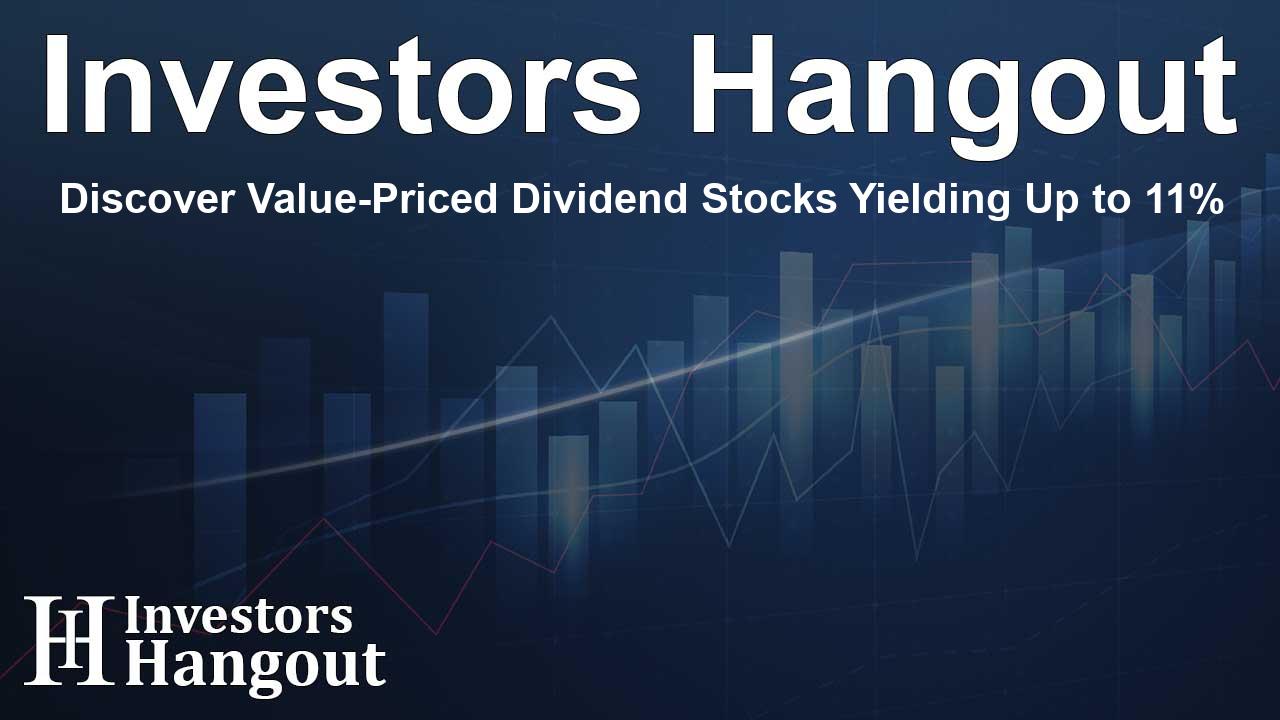Discover Value-Priced Dividend Stocks Yielding Up to 11%

Value Options in a Pricey Market
The current market appears costly compared to historical standards. This prompts a search for affordable dividend stocks instead of typical low-yield exchange-traded funds (ETFs).
Value investing offers attractive options with yields ranging from 5% to 11%. Let's dive into some noteworthy selections.
Understanding Valuations and Opportunities
Recently, we witnessed a rapid bounce-back in the stock market after a brief decline. This swift recovery caused the S&P 500 to reach elevated valuation levels, evident with a forward price-to-earnings (P/E) ratio of 22.1, reminiscent of the highs during past market recoveries.
In this context, we can focus on opportunities with two key metrics:
- Strong dividends: These stocks provide yields well above the market average.
- Affordable price-to-cash-flow ratios: These companies possess low valuations compared to the cash flow they generate.
AES Corp. as a Utility Play
One standout name in this arena is AES Corp. (AES, 5.5% yield), which offers stability due to its nature as an electric utility. Despite being perceived as a safer investment, AES also has growth prospects through its renewable energy services.
AES shares are trading at about 5 times cash-flow estimates and possess a PEG ratio of 0.6, highlighting the company's affordability based on growth expectations. With a yield exceeding 5%, AES is an appealing option within its sector.
Exploring Edison International's Dynamics
Another notable utility stock is Edison International (EIX, 5.9%). It oversees Southern California Edison, serving over 15 million customers and focusing heavily on renewable energy sources.
However, EIX has grappled with legal challenges related to wildfire damage, leading to a substantial loss in share value. This dilemma makes banking on EIX a riskier proposition compared to typical utility stocks.
Amcor: A Defensive Yet Cyclical Choice
Amcor (AMCR, 5.2% yield), known for its packaging expertise, operates in a defensive manner despite being classified as a cyclical stock. It serves diverse industries, from food packaging to healthcare.
Its status as a Dividend Aristocrat with a yield over 5% sets it apart. While shares tend to be less volatile, its current cash flow valuation stands at around 6 times, making it moderately attractive.
Kodiak Gas Services: An Energy Sector Player
Kodiak Gas Services (KGS, 5.2% yield) operates in the natural gas compression business, securing long-term contracts critical for upstream and midstream energy operations.
The acquisition of CSI Compressco LP positions Kodiak favorably in the market, and its shares have grown into a dividend stock, showing promise with a yield surpassing 5% and valuation metrics pointing toward a strong market position.
Atlas Energy Solutions: Navigating Challenges
Atlas Energy Solutions (AESI, 8.4% yield) provides essential services to oil and gas companies, notably in hydraulic fracturing. However, it recently faced struggles that affected its dividend growth streak.
The stock became substantially less expensive amid declining frac-sand prices but maintains sufficient free cash flow to support its dividend obligations.
United Parcel Service: A Unique Case
United Parcel Service (UPS, 7.5%) is characterized by a yield exceeding 7%, unusual for a blue-chip company. Despite this attractive yield, UPS has confronted significant challenges, including a weakened forecast for the coming year.
These factors led to a deep decline in share value, although UPS maintains a solid dividend backed by strong cash flow.
Western Union: Resilience Meets Challenge
Western Union (WU, 11.3%) continues to operate despite increased competition from digital payment apps. Its dividend yield appears enticing but is primarily the result of plummeting share prices.
As WU focuses on modernizing its offerings through various initiatives, it remains to be seen how well it can adapt to the evolving financial landscape while managing its ongoing challenges.
Frequently Asked Questions
What are value-priced dividend stocks?
Value-priced dividend stocks are shares in companies that provide attractive dividends while trading at low prices relative to their earnings.
How do I identify strong dividend stocks?
Look for companies with a reliable history of dividend payments, high yields, and sustainable cash flow combined with manageable debt levels.
Are high yielding stocks safe investments?
High-yield stocks come with risks. It's essential to assess the company's financial health and industry stability to gauge safety.
Can dividend stocks provide long-term growth?
Yes, dividend stocks can contribute to long-term growth through reinvestment strategies, increasing income over time.
What is the significance of cash flow in evaluating stocks?
Cash flow indicates a company's ability to generate cash from operations, which is crucial for paying dividends and funding business growth.
About The Author
Contact Olivia Taylor privately here. Or send an email with ATTN: Olivia Taylor as the subject to contact@investorshangout.com.
About Investors Hangout
Investors Hangout is a leading online stock forum for financial discussion and learning, offering a wide range of free tools and resources. It draws in traders of all levels, who exchange market knowledge, investigate trading tactics, and keep an eye on industry developments in real time. Featuring financial articles, stock message boards, quotes, charts, company profiles, and live news updates. Through cooperative learning and a wealth of informational resources, it helps users from novices creating their first portfolios to experts honing their techniques. Join Investors Hangout today: https://investorshangout.com/
The content of this article is based on factual, publicly available information and does not represent legal, financial, or investment advice. Investors Hangout does not offer financial advice, and the author is not a licensed financial advisor. Consult a qualified advisor before making any financial or investment decisions based on this article. This article should not be considered advice to purchase, sell, or hold any securities or other investments. If any of the material provided here is inaccurate, please contact us for corrections.
